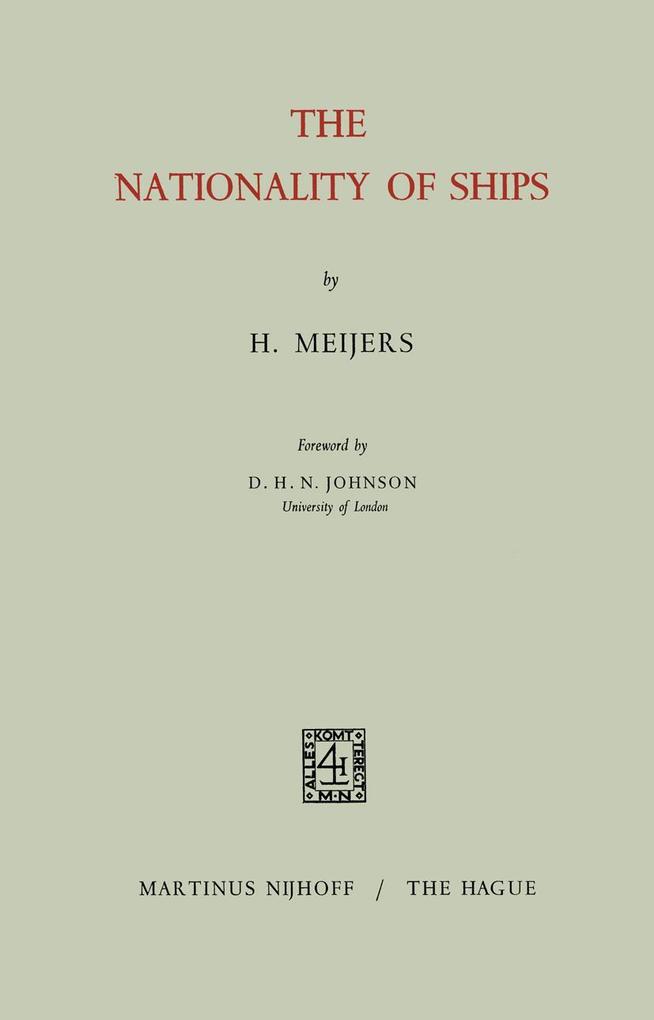
Zustellung: Mo, 30.12. - Do, 02.01.25
Versand in 2 Tagen
VersandkostenfreiBestellen & in Filiale abholen:
It gives me great pleasure to introduce this work by Dr. H. Meyers. The problem of "The Nationality of Ships" has long been one of the most difficult problems in the international law of the sea. It has been made more acute recently by the growth of "flags of convenience". Legally, the problem has been complicated or simplified-according to one's point of view-by the emergence of the concept of the "genuine link" associated with the Judgment of the International Court of Justice in the Nottebohm case (second phase) in 1955. Other develop ments have included the thorough preparatory work of the Internation al Law Commission leading up to the United Nations Conference on the Law of the Sea, held in Geneva in 1958; the debates at that Con ference and particularly its adoption of the Convention on the High Seas; and finally the Advisory Opinion of the International Court of Justice in the case concerning the Constitution of the Maritime Safety Committee of the Inter-Governmental Maritime Consultative Organisation in 1960. All these developments have thrown light on the problem ofthe allocation of ships to one or other of the politically organised territorial communities (or States) of which the present international society is largely composed. But an agreed solution acceptable to all the interests concerned seems as far away as ever. The question of ships operated by international institutions such as the United Nations is another problem which awaits a satisfactory answer.
Inhaltsverzeichnis
I: Introduction. - 1. Outline. - 2. Ships. - 3. Nationality. - II: The Meaning of Allocation. - 1. Introduction. - 2. The term jurisdiction. - 3. Which international person may have the power to prescribe rules of conduct, to threaten sanctions, and to enforce sanctions with regard to the ship-users? . - 4. The right to prescribe rules for ship-users. - 5. The right to enforce sanctions against ship-users. - 6. The right of protection. - 7. The duties of the flag state. - III: Acquisition of Allocation. - 1. Introduction. - 2. Terminology. - 3. The relation between immatriculation, nationality , registration , documentation and flag . - 4. The cognoscible decision to immatriculate. - 5. Multiple allocation. - 6. Fraud. - 7. Evidence of allocation. - IV: Sufficient Authority. - 1. Introduction. - 2. History of the third sentence of article 5. - 3. Exclusive authority. - 4. The purpose of the genuine link . - 5. Genuine link the expression and its concretion. - 6. Means government agencies outside the flag state. - 7. Means government agencies within the flag state. - 8. A complete and a partial irrelevance. - 9. The genuine link a condition and a precept. - 10. Some conclusions with respect to the application of the genuine link rule. - V: Three Particular Questions. - 1. Loss and change of allocation. - 2. Statelessness. - 3. International Organizations. - VI: Summary. - Cases Mentioned in the Text. - General Index.
Produktdetails
Erscheinungsdatum
01. Januar 1967
Sprache
englisch
Auflage
Softcover reprint of the original 1st ed. 1967
Seitenanzahl
412
Autor/Autorin
Herman Meyers
Verlag/Hersteller
Produktart
kartoniert
Abbildungen
395 p.
Gewicht
650 g
Größe (L/B/H)
244/156/23 mm
Sonstiges
Paperback
ISBN
9789401186933
Entdecken Sie mehr
Bewertungen
0 Bewertungen
Es wurden noch keine Bewertungen abgegeben. Schreiben Sie die erste Bewertung zu "The Nationality of Ships" und helfen Sie damit anderen bei der Kaufentscheidung.









